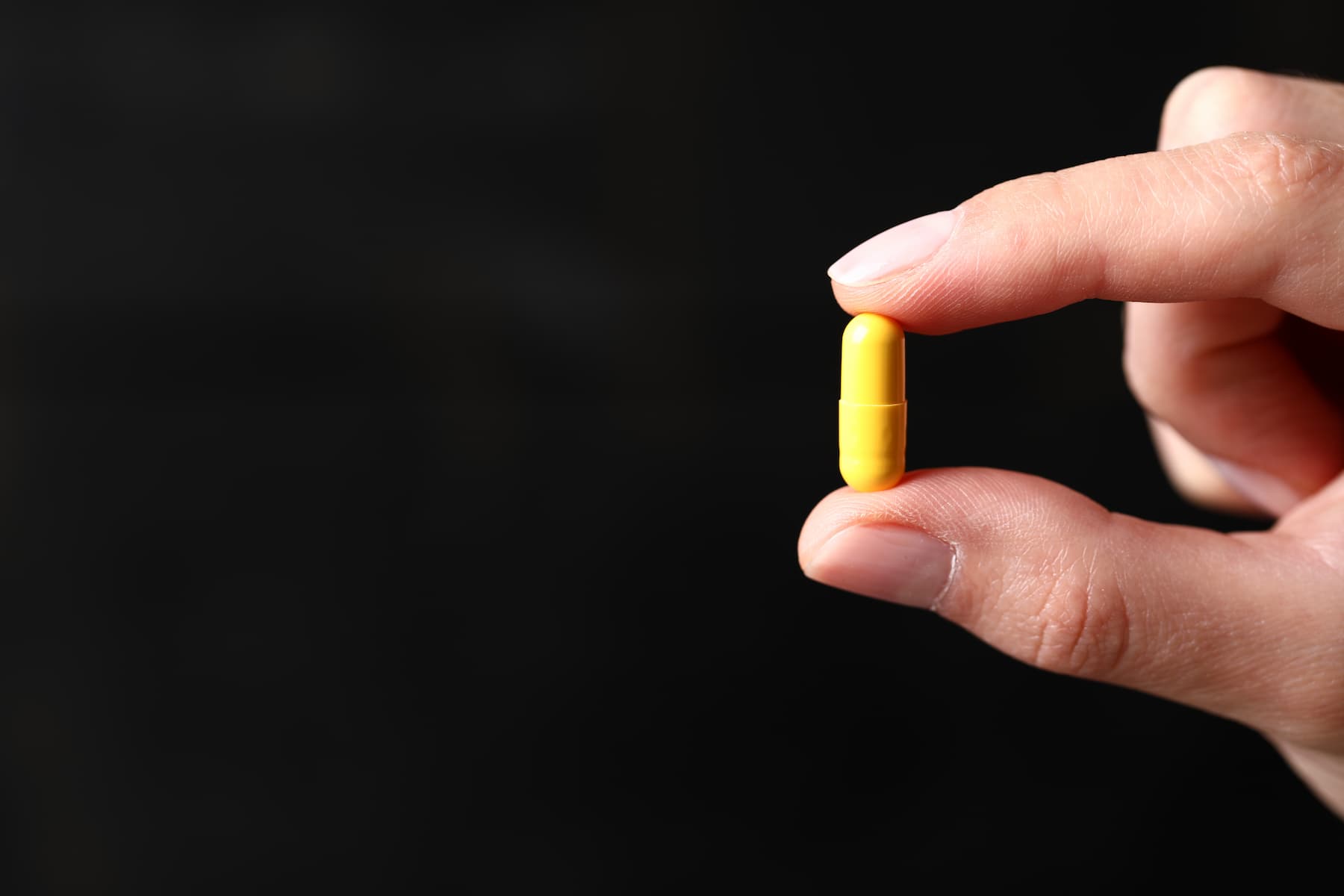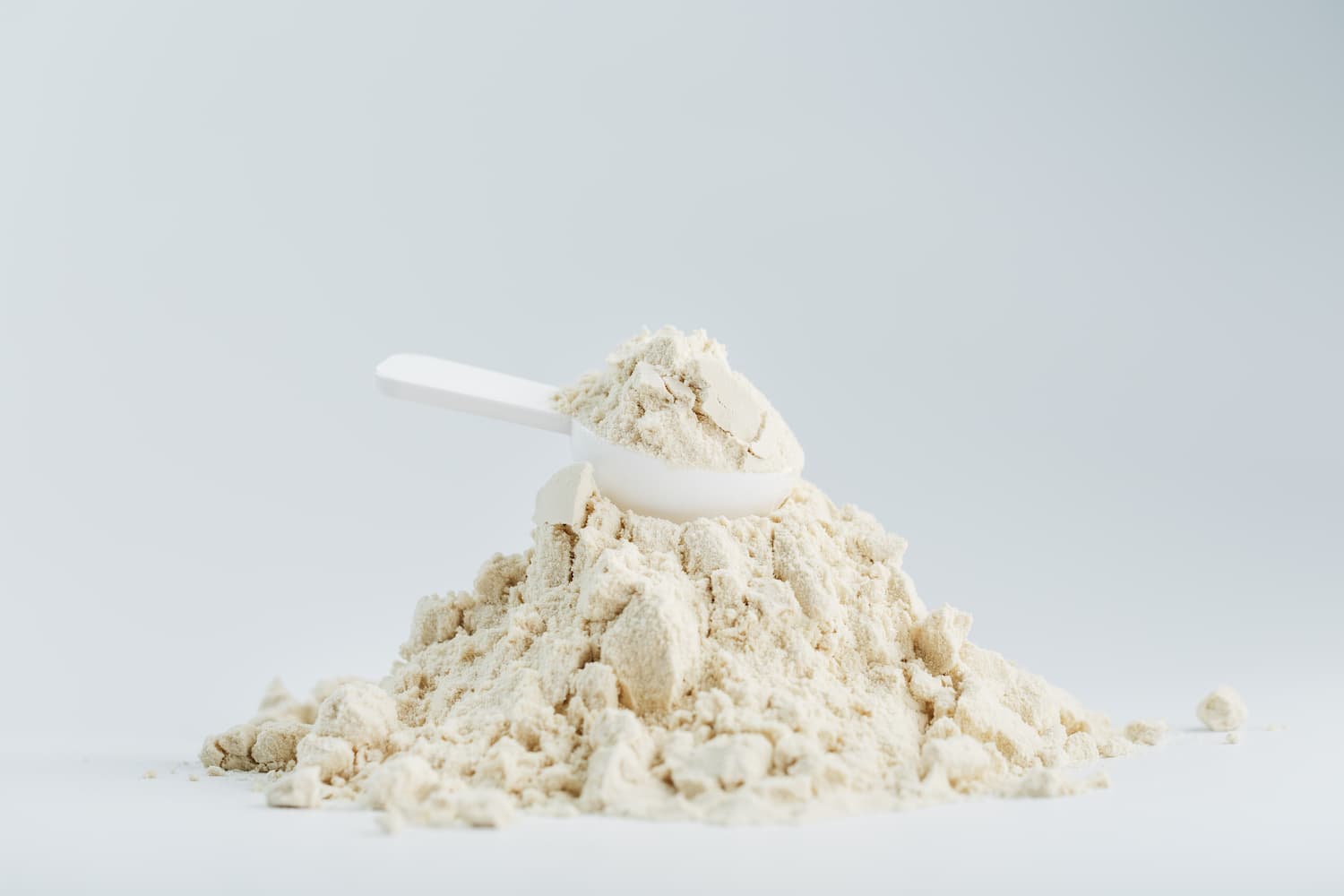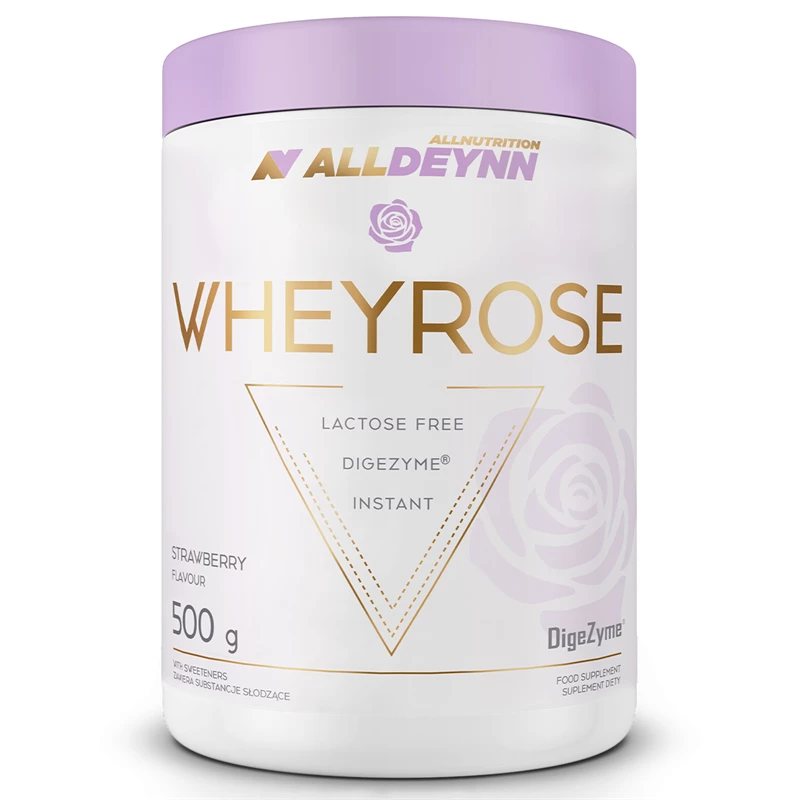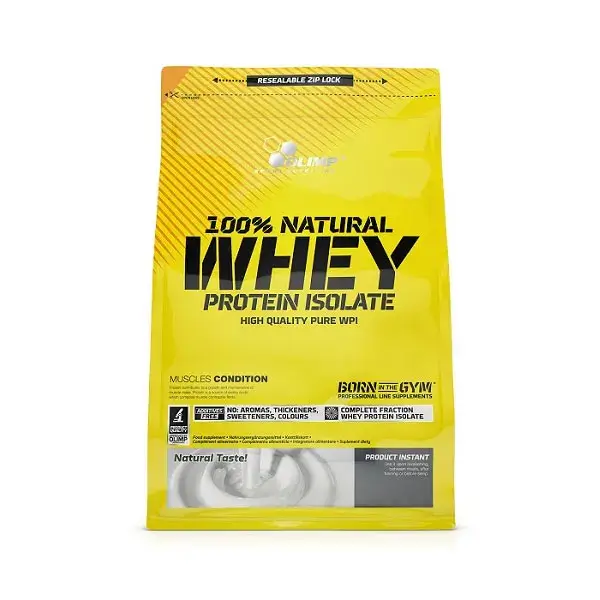Arginine (L-arginine) - what it is, effects, for what, side effects
Arginine supports tissue regeneration, muscle mass gain and... libido!


Learn more about our editorial process
.

Learn more about our editorial process
.

Learn more about our editorial process
.

Learn more about our editorial process
.
Why you can trust us
Articles on Natu.Care are written based on scientific research, data from government websites and other reliable sources. The texts are written in cooperation with doctors, nutritionists and other health and beauty experts. Articles are reviewed before publication and during significant updates.
.Learn more about our editorial process
.Information about advertisements
Content on Natu.Care may contain links to products from the sale of which we may receive a commission. When creating content, we adhere to high editorial standards and take care to be objective about the products discussed. The presence of affiliate links is not dictated by our partners, and we select the products we review ourselves completely independently.
.Learn more about our terms and Conditions
.Arginine supplementation can support blood pressure regulation, speed up recovery after exercise, and also... support sexual function. These seem like good reasons to take it, right? Not necessarily - this amino acid is naturally produced by the body, so the need for supplementation occurs in very few people.
With clinical nutritionist Jakub Pągowski, we will give you some tips on who should supplement arginine. Find out if you are the chosen one.
From this article you will learn:
.- What arginine is and how it differs from L-arginine. .
- What arginine does and how to dose it safely.
- What arginine does and how to dose it safely.
- In which foods you can find arginine. .
- How to supplement arginine and whether it causes side effects. .
See also:
.What is arginine?
.Arginine is a amino acid that is crucial for many processes in the human body. Its main functions include removing ammonia, supporting the immune system, promoting wound healing, and producing nitric oxide, which is important for cardiovascular health and sexual functionand.
Arginine is an endogenous amino acid, meaning that your body naturally produces it and usually produces it in sufficient amounts. However, in some cases, such as chronic stress, infections or trauma, the need for arginine increases and the body may "not be able to keep up" with production. It is then worth considering supplementationand.
Arginine versus L-arginine - what are the differences?
.Most amino acids exist in the form of isomers, which are molecules with identical atoms but a different spatial configuration. These isomers are designated as 'L' or 'D'. However, only the forms with an 'L' are biologically active and used by the body in various processesand.
Natural L-arginine is therefore the chemical form of arginine. The letter 'L' refers to the configuration of the molecule, specifically the direction in which a carbon atom is attached to its neighbouring atoms.
The letter 'L' refers to the configuration of the molecule, specifically the direction in which a carbon atom is attached to its neighbouring atoms.
In the context of supplementation, when we refer to 'arginine', we usually refer to the L-arginine form, as it is the one that is more biologically active compared to D-arginine.
In very simple terms, we can say that L-arginine = arginine, as it is this form that you will find in dietary supplements.
What structural formula does arginine have?
.Arginine is an amino acid with the chemical formula C6H14N4O2. This molecule contains six carbon atoms, fourteen hydrogen atoms, four nitrogen atoms and two oxygen atoms. It is made up of an amine group, a carboxyl group and a side group, the structure of which is particularly characteristicand.
What arginine is for - action and properties
.Arginine is a valuable amino acid that has many important functions in the body. It is known for its beneficial effects on heart health, improving exercise performance and also supporting the treatment of erectile dysfunction. What does arginine give you?
.Supports athletes
.Arginine plays a key role in the synthesis of nitric oxide, which is essential for proper vasodilation. This allows for increased blood flow to the muscles during intense training. As a result, arginine is an invaluable ally of athletes who want to increase their performance and enduranceand.
Also, arginine increases blood flow, which in turn promotes the delivery of oxygen and nutrients to the muscles, speeding up their recovery after a hard workout. In addition, arginine has a stimulating effect on the production of Growth Hormone (GH, Growth Hormone), which accelerates anabolic processes, enabling faster muscle mass developmentand.
Another benefit of arginine supplementation in athletes is its ability to remove ammonia from the body, a by-product of protein metabolism that can lead to muscle fatigue. This allows athletes to train harder and longer, without injury or discomfortand.
See also:
.Study
A study was conducted in 2016 to examine the effects of arginine supplementation on muscle mass and athletic performance. The research study involved 56 football players aged 16-35 years who supplemented with 2 grams of L-arginine daily for 45 days. Sports performance increased significantly in the group taking arginine compared to placeboand.
Arginine also aids the removal of metabolic metabolites such as lactic acid formed during exercise. As a result, we recover faster, have less sore muscles and feel less tired overall..
 .
.
Kuba Pągowski clinical dietitian
Interesting facts
Several scientific studies have shown that oral arginine supplementation increases resting growth hormone levels by at least 100%, while with exercise the values are as high as 300-500%.
Promotes blood pressure regulation
.Arginine is a precursor for nitric oxide (NO), which is a powerful compound capable of dilating blood vessels. As a result, it promotes the free flow of blood through the body, which in turn helps maintain normal blood pressureand.
The vasodilation of blood vessels by nitric oxide not only improves blood flow, but also reduces vascular wall tension, which further lowers blood pressure. As a result, arginine may help alleviate high blood pressureand.
Study
.A review of seven studies was conducted in 2016, examining the effects of arginine on blood pressure regulation. The scientific work found, that taking this amino acid (in intravenous or oral form) could reduce systolic blood pressure by 5.4 mm/Hg and diastolic blood pressure by 3.1 mm/Hg. Furthermore, the use of this compound also reduced the length of hospital stay in surgical patients, as well as reducing the incidence of hospital-acquired infections by 40%and.
Influences the maintenance of normal sugar levels
.Arginine stimulates the production and secretion of insulin, the hormone that regulates blood glucose levels. In addition, arginine can increase tissue sensitivity to insulin, so organs are able to use glucose more efficientlyand.
Arginine's ability to stimulate insulin production can be beneficial especially for those with insulin resistance, a condition in which the body loses its ability to respond properly to insulin. This, in turn, can lead to excessive glucose build-up in the blood, causing hyperglycaemiaand.
However, as with blood pressure regulation, arginine supplementation should be discussed with your doctor, especially if you are already diagnosed with diabetes or insulin resistance.
Testing
One study verified the effect of arginine supplementation in middle-aged people with metabolic syndrome and abnormal glucose tolerance. The research study involved 144 patients who supplemented with 6.4 g of arginine daily for 18 months. After one and a half years, no major differences were noticed, but follow-up continued for a further 90 months. With the end of the study, the results were as follows: those supplementing with arginine had about 17 percentage points lower risk of diabetesand.
Helps treat erectile dysfunction
.Arginine before sex increases blood flow to the penis, which can improve erection and potency. Nitric oxide - key to the erection mechanism - leads to vasodilation of blood vessels, allowing blood flow to the penis, which is essential for achieving and maintaining an erectionand.
Some studies show that arginine supplementation for libido can increase the production of nitric oxide in the body, which in turn can improve blood flow to the penis and aid erection. The use of arginine could therefore potentially help men with erectile dysfunctionand.
See also: Potency and erectile dysfunction tablets without prescription
.Study
A meta-analysis of 10 studies from 2019 looked at the effects of arginine on erectile dysfunction. A total of 540 patients struggling with the problem took part in the research work. Taking 1,500-5,000 mg of arginine per day significantly reduced the men's dysfunction. What's more, the supplements also improved satisfaction with sexual intercourse, as well as orgasmand.
Supports patients with serious illnesses
.When serious infections or injuries occur, the demand for arginine increases significantly. This is when the body is no longer able to produce sufficient amounts of this nutrient on its own. And arginine deficiency in patients who are seriously ill or have undergone surgery can lead to reduced blood flow or impaired immune function, which is particularly dangerous for themand.
This is why arginine is given orally or intravenously to patients with serious infections, such as necrotising enterocolitis in infants. It is also sometimes used for the treatment of chronic wounds, and after trauma or surgery.
L-arginine - dosage
.The dosage of arginine depends on the expected effects. For example, studies on the regulation of blood pressure have looked at portions of 6 to as much as 30 grams per day. On the other hand, in scientific studies on erectile dysfunction, doses of 1.5-5 gramsand have proven effective.
Furthermore, one study lasting 90 days involving 142 people tested the effects of 30 grams of arginine per day on the human body. This dose proved safe and was not associated with any side effectsand.
Despite this, it is not recommended to take more than 7-9 grams of arginine per day. The above studies were conducted under the guidance of specialists, so it is better to use lower portions to avoid potential side effectsand.
Where arginine is found - food products
.Arginine is an amino acid that occurs naturally in many foods. The best sources of arginine areand:
- Meat - poultry, beef, pork.
- Meat - poultry, beef, pork.
- Nuts - walnuts, cashews, hazelnuts.
- Nuts - walnuts, cashews, hazelnuts.
- Seeds - pumpkin seeds, sunflower seeds, sesame seeds, chia seeds, flax seeds.
- Fish - salmon, tuna, halibut.
- Food - milk, yoghurt, cheeses. .
- Cereals - oatmeal, brown rice, quinoa. .
- legumes - beans, chickpeas, lentils, soybeans.
- Dark green leafy vegetables - spinach, kale, broccoli, peas.
Arginine - supplementation
.Arginine supplementation is popular among physically active people. This amino acid helps to dilate blood vessels and improve blood flow, aiding recovery and muscle performance. As a result, it can help improve training performance and faster recovery from intense exerciseand.
Arginine is a popular supplement in so-called pre-workout supplements. It is often combined with citrulline or caffeine. It can also be found in the form of AAKG - a compound consisting of two molecules of L-arginine combined with alpha-ketoglutaric acid..
 .
.
Kuba Pągowski clinical dietitian
Arginine may be helpful for people suffering from certain health problems. For example, some studies suggest that it may help to regulate blood pressure, improve vascular function in people with heart disease, or support the treatment of erectile dysfunction.
In the gut we have high arginase activity, which strongly inhibits arginine (because it breaks it down). Therefore, it is worth supplementing arginine with citrulline - this increases and speeds up the effects of the treatment.
According to some studies, supplementation with citrulline raises blood arginine levels better than taking arginine aloneand.
.Where to buy arginine?
.Arginine can be purchased both at a pharmacy and online. However, you will not encounter it in drugstores such as Rossmann. Rather, look for it in specialist dietary supplement shops. Typically, arginine comes in powder or tablet form.
How long to use?
.How long to use arginine depends on the purpose of the supplementation and the individual health situation. There is no uniform recommended duration of intake, so it is advisable to consult your doctor when deciding on the length of supplementation.
Physically active people usually take it during periods of intense training. On the other hand, in the case of cardiovascular disease or immune system problems, arginine can be used for longer periods of time under medical supervision.
Arginine can be used for longer periods of time under medical supervision.
Arginine in tablets is quite inconvenient to supplement. What's more, it's worth looking at the composition of preparts to check how much of this arginine is actually in them. Sometimes you can be unpleasantly surprised..
 .
.
Kuba Pągowski clinical dietitian
When to take - morning or evening?
.The timing of arginine supplementation depends on your supplementation goal. If you want to improve your performance during physical activity and support recovery, take arginine approximately 30-60 minutes before training.
People expecting erectile support should also take arginine about 30-60 minutes before intercourse.
If, on the other hand, you are interested in long-term benefits (such as blood pressure or sugar regulation) it is worth using arginine between meals. There is some indication that this increases its bioavailabilityand.
What is the best arginine?
.The best arginine is L-arginine. It is the active form of this amino acid that can effectively support the body, helping athletes or people with abnormal blood pressure. It can be found in numerous supplements, such as SLEEPROSE, which makes it easier to fall asleep and improves quality of sleep.
ALLDEYNN WHEYROSE
Product description
Protein supplement containing whey protein concentrate (WPC) with added digestive enzymesós. It digests well, is an easy and quick way to provide protein and can be consumed by people with lactose intolerance. It will work well not only as a stand-alone drinkóy but also as a tasty addition to shakesóy, dessertsóy, oatmeal or omeletóy.
WHEYROSE contains five digestive enzymes that help break down macromolecules into smaller components, so that the ingredients from food and the nutrient are absorbed even better. This minimises or even eliminates digestive discomfort. Such an addition is rare in protein supplements.
.Pros and cons
Protein supplement containing whey protein concentrate (WPC) with added digestive enzymesós. It digests well, is an easy and quick way to provide protein and can be consumed by people with lactose intolerance. It will work well not only as a stand-alone drinkóy but also as a tasty addition to shakesóy, dessertsóy, oatmeal or omeletóy.
WHEYROSE contains five digestive enzymes that help break down macromolecules into smaller components, so that the ingredients from food and the nutrient are absorbed even better. This minimises or even eliminates digestive discomfort. Such an addition is rare in protein supplements.
.Additional information
Protein supplement containing whey protein concentrate (WPC) with added digestive enzymesós. It digests well, is an easy and quick way to provide protein and can be consumed by people with lactose intolerance. It will work well not only as a stand-alone drinkóy but also as a tasty addition to shakesóy, dessertsóy, oatmeal or omeletóy.
WHEYROSE contains five digestive enzymes that help break down macromolecules into smaller components, so that the ingredients from food and the nutrient are absorbed even better. This minimises or even eliminates digestive discomfort. Such an addition is rare in protein supplements.
.User review
Protein supplement containing whey protein concentrate (WPC) with added digestive enzymesós. It digests well, is an easy and quick way to provide protein and can be consumed by people with lactose intolerance. It will work well not only as a stand-alone drinkóy but also as a tasty addition to shakesóy, dessertsóy, oatmeal or omeletóy.
WHEYROSE contains five digestive enzymes that help break down macromolecules into smaller components, so that the ingredients from food and the nutrient are absorbed even better. This minimises or even eliminates digestive discomfort. Such an addition is rare in protein supplements.
.ALLDEYNN VEGEROSE
Product description
A protein supplement made from five plant proteins enriched with acacia fibre, flaxseed, MCT oil and the probiotic-prebiotic complex LactoWise®. It is a synbiotic thatós stimulates the developmentóy and growth of beneficial bacteria in the gastrointestinal tract and shows a beneficial effect on the condition of the digestive system.
Pros and cons
A protein supplement made from five plant proteins enriched with acacia fibre, flaxseed, MCT oil and the probiotic-prebiotic complex LactoWise®. It is a synbiotic thatós stimulates the developmentóy and growth of beneficial bacteria in the gastrointestinal tract and shows a beneficial effect on the condition of the digestive system.
Additional information
A protein supplement made from five plant proteins enriched with acacia fibre, flaxseed, MCT oil and the probiotic-prebiotic complex LactoWise®. It is a synbiotic thatós stimulates the developmentóy and growth of beneficial bacteria in the gastrointestinal tract and shows a beneficial effect on the condition of the digestive system.
Expert opinion
A protein supplement made from five plant proteins enriched with acacia fibre, flaxseed, MCT oil and the probiotic-prebiotic complex LactoWise®. It is a synbiotic thatós stimulates the developmentóy and growth of beneficial bacteria in the gastrointestinal tract and shows a beneficial effect on the condition of the digestive system.
ALLDEYNN VEGEROSE
Product description
A protein supplement made from five plant proteins enriched with acacia fibre, flaxseed, MCT oil and the probiotic-prebiotic complex LactoWise®. It is a synbiotic thatós stimulates the developmentóy and growth of beneficial bacteria in the gastrointestinal tract and shows a beneficial effect on the condition of the digestive system.
Pros and cons
A protein supplement made from five plant proteins enriched with acacia fibre, flaxseed, MCT oil and the probiotic-prebiotic complex LactoWise®. It is a synbiotic thatós stimulates the developmentóy and growth of beneficial bacteria in the gastrointestinal tract and shows a beneficial effect on the condition of the digestive system.
Additional information
A protein supplement made from five plant proteins enriched with acacia fibre, flaxseed, MCT oil and the probiotic-prebiotic complex LactoWise®. It is a synbiotic thatós stimulates the developmentóy and growth of beneficial bacteria in the gastrointestinal tract and shows a beneficial effect on the condition of the digestive system.
Expert opinion
A protein supplement made from five plant proteins enriched with acacia fibre, flaxseed, MCT oil and the probiotic-prebiotic complex LactoWise®. It is a synbiotic thatós stimulates the developmentóy and growth of beneficial bacteria in the gastrointestinal tract and shows a beneficial effect on the condition of the digestive system.
Arginine - side effects
.Arginine is generally well tolerated, but like any dietary supplement, it can cause some side effects. The most common are gastrointestinal complaints such as nausea, abdominal pain and diarrhoea. Heartburn and bloating may also occurand.
Some studies suggest that high doses of arginine may lower blood pressure. Therefore, people with low blood pressure or those taking medication for high blood pressure should consult a doctor before starting supplementation to avoid the potential risk of hypo- or hypertension .
In rare cases, arginine can affect electrolyte balance, leading to changes in the levels of potassium in the blood. So it is worth consulting your doctor before starting supplementation, especially if you suffer from any chronic illnesses or take medication regularlyand.
Arginine - reviews
.Since I started taking arginine, I have noticed an improvement in my endurance during workouts. I also recover much quicker and can maintain the intensity of my workouts for longer. I can really see the difference..
Krystian28 years old
I took arginine for a month before sex and my erection problems decreased significantly. It helped my relationship, so I would definitely recommend it to other men with similar problems..
Wojciech46 years old
I did not experience any improvement during arginine supplementation. I was hoping it would help with my blood pressure problems, but unfortunately I can't see any difference..
Bartek60 years old
I train hard at the gym and take arginine after training. It helps me with muscle recovery and accelerates my rate of muscle mass gain..
Lukasz25 years old
.I've read that arginine is supposed to help with erection problems, but personally I haven't seen any difference. I am now considering trying other potency pills..
Gorz32 years old
.See also:
- Creatine
- Protein nutrient
- Whey protein isolate (WPI) .
- Whey protein concentrate (WPC) .
- Whey protein hydrolysate (WPH)
- L-carnitine
- BCAA
- Berberine for weight loss
Summary
.- Arginine is an amino acid involved in many processes in the human body, such as removing ammonia, supporting the immune system and supporting sexual function.
- The L-arginine form is the most biologically active and it is the one usually used in dietary supplements. .
- Arginine dosage depends on the purpose of supplementation, but is usually several grams per day. .
- Arginine is found in a wide range of foods such as meat, nuts, seeds, fish, dairy, cereals, legumes and dark green leafy vegetables.
- Arginine is also found in a wide range of foods such as meat, nuts, seeds, fish, dairy, cereals, legumes and dark green leafy vegetables.
- Arginine is well tolerated, but at high doses it can cause gastrointestinal discomfort or lower blood pressure. .
- Reviews of arginine supplementation are mixed - some people see benefits, but others see no clear difference. .
FAQ
Does arginine occur in cosmetics?
.Yes, arginine for men and women is often used in cosmetics. It shows moisturising and anti-ageing properties, so you can find it in lotions, creams or shampoos.
Arginine, as a amino acid, helps in the regeneration and renewal of skin cells (prevents wrinkles) and hair. Additionally, it supports anti-dandruff therapies and helps fight seborrhoeic dermatitis.
Arginine or citrulline - which to choose?
.The choice between arginine and citrulline depends on individual goals. Both have the ability to increase nitric oxide production and improve blood flow. Arginine is often used to improve training performance and support the immune system.
Citrulline, on the other hand, is usually preferred for muscle repair and increasing energy. Both have beneficial effects on heart health. The final choice depends on your specific needs. These two compounds are ingredients in so-called pre-workout supplements and can be used simultaneously to improve workout performance.
Arginine and alcohol - can they be combined?
.It is not recommended to combine arginine with alcohol. Arginine is an amino acid that helps to cleanse the body, whereas alcohol can reduce its levels in the body, limiting its health benefits.
What's more, both affect the vascular system, so when consumed together, they can result in excessively low blood pressure.
Does arginine help with weight loss?
.Arginine may support weight loss, but not directly. Its ability to increase blood flow to the muscles may improve performance during training, which may translate into better training efficiency and more kilocalories burned.
Is arginine safe for children?
.Although arginine is a amino acid naturally occurring in the body, its supplementation is not usually recommended for children without consulting a doctor. In certain medical situations, such as very serious problems with the immune system, the youngest can take arginine. However, this must always take place under the guidance of a specialist.
Is arginine safe for pregnant women?
.During pregnancy, any supplementation should be consulted with a doctor. Although arginine is usually safe, its effects on pregnancy and fetal development have not been fully studied. Therefore, always consult your doctor before starting any supplementation during pregnancy.
Can arginine interact with other drugs?
.Arginine may interact with some drugs. The most common of these are hypertension remedies - arginine can lower blood pressure, which will lead to dangerous spikes in this parameter. In addition, arginine can react with diabetes medications, as it itself lowers blood sugar levels.
Always consult your doctor before starting supplementation.
Can arginine help with heart disease?
.Research has shown that arginine can have a positive effect on heart health by improving blood flow and regulating blood pressure. Although it may have benefits for people with heart disease, arginine should not be used as a replacement for conventional therapy.
Can arginine help with rashes?
.Some studies have shown that arginine can help wound healing and support skin regeneration processes, which may translate into improvements in some skin problems, such as rashes. However, in such cases, it is always best to consult a doctor.
Can arginine help with sleep problems?
.There is no direct evidence for the effect of arginine on improving sleep. Despite this amino acid it has been shown to have a number of health benefits, such as improved blood flow and blood pressure regulation, which may contribute to overall improved health, which may indirectly lead to improved quality of sleep.
Resources
.See all
.Aguiar, A. F., Balvedi, M. C. W., Buzzachera, C. F., Altimari, L. R., Lozovoy, M. A. B., Bigliassi, M., Januário, R. S. B., Pereira, R. M., Sanches, V. C., da Silva, D. K., & Muraoka, G. A. (2016). L-Arginine supplementation does not enhance blood flow and muscle performance in healthy and physically active older women. European Journal of Nutrition, 55(6), 2053-2062. https://doi.org/10.1007/s00394-015-1019-6
Böger, R. H., & Bode-Böger, S. M. (2001). The clinical pharmacology of L-arginine. Annual Review of Pharmacology and Toxicology, 41, 79-99. https://doi.org/10.1146/annurev.pharmtox.41.1.79
Camarena Pulido, E. E., García Benavides, L., Panduro Barón, J. G., Pascoe Gonzalez, S., Madrigal Saray, A. J., García Padilla, F. E., & Totsuka Sutto, S. E. (2016). Efficacy of L-arginine for preventing preeclampsia in high-risk pregnancies: A double-blind, randomized, clinical trial. Hypertension in Pregnancy, 35(2), 217-225. https://doi.org/10.3109/10641955.2015.1137586
Fayh, A. P. T., Krause, M., Rodrigues-Krause, J., Ribeiro, J. L., Ribeiro, J. P., Friedman, R., Moreira, J. C. F., & Reischak-Oliveira, A. (2013). Effects of L-arginine supplementation on blood flow, oxidative stress status and exercise responses in young adults with uncomplicated type I diabetes. European Journal of Nutrition, 52(3), 975-983. https://doi.org/10.1007/s00394-012-0404-7
FoodData Central. (n.d.). Retrieved December 18, 2023, from https://fdc.nal.usda.gov/fdc-app.html#/
Gambardella, J., Khondkar, W., Morelli, M. B., Wang, X., Santulli, G., & Trimarco, V. (2020). Arginine and Endothelial Function. Biomedicines, 8(8), 277. https://doi.org/10.3390/biomedicines8080277
Kanaley, J. A. (2008). Growth hormone, arginine and exercise. Current Opinion in Clinical Nutrition and Metabolic Care, 11(1), 50-54. https://doi.org/10.1097/MCO.0b013e3282f2b0ad
Hu, S., Han, M., Rezaei, A., Li, D., Wu, G., & Ma, X. (2017). L-Arginine Modulates Glucose and Lipid Metabolism in Obesity and Diabetes. Current Protein & Peptide Science, 18(6), 599-608. https://doi.org/10.2174/1389203717666160627074017
McRae, M. P. (2016). Therapeutic Benefits of l-Arginine: An Umbrella Review of Meta-analyses. Journal of Chiropractic Medicine, 15(3), 184-189. https://doi.org/10.1016/j.jcm.2016.06.002
Melik, Z., Zaletel, P., Virtic, T., & Cankar, K. (2017). L-arginine as dietary supplement for improving microvascular function. Clinical Hemorheology and Microcirculation, 65(3), 205-217. https://doi.org/10.3233/CH-16159
Monti, L. D., Galluccio, E., Villa, V., Fontana, B., Spadoni, S., & Piatti, P. M. (2018). Decreased diabetes risk over 9 year after 18-month oral l-arginine treatment in middle-aged subjects with impaired glucose tolerance and metabolic syndrome (extension evaluation of l-arginine study). European Journal of Nutrition, 57(8), 2805-2817. https://doi.org/10.1007/s00394-017-1548-2
Morris, S. M. (2006). Arginine: Beyond protein. The American Journal of Clinical Nutrition, 83(2), 508S-512S. https://doi.org/10.1093/ajcn/83.2.508S
N, P., Mh, E., M, N., A, M., M, R., M, B.-B., & O, S. (2017). The effect of l-arginine supplementation on body composition and performance in male athletes: A double-blinded randomized clinical trial. European Journal of Clinical Nutrition, 71(4). https://doi.org/10.1038/ejcn.2016.266
Patel, J. J., Miller, K. R., Rosenthal, C., & Rosenthal, M. D. (2016). When Is It Appropriate to Use Arginine in Critical Illness? Nutrition in Clinical Practice, 31(4), 438-444. https://doi.org/10.1177/0884533616652576
Rhim, H. C., Kim, M. S., Park, Y.-J., Choi, W. S., Park, H. K., Kim, H. G., Kim, A., & Paick, S. H. (2019). The Potential Role of Arginine Supplements on Erectile Dysfunction: A Systemic Review and Meta-Analysis. The Journal of Sexual Medicine, 16(2), 223-234. https://doi.org/10.1016/j.jsxm.2018.12.002
Shiraseb, F., Asbaghi, O., Bagheri, R., Wong, A., Figueroa, A., & Mirzaei, K. (2022). Effect of l-Arginine Supplementation on Blood Pressure in Adults: A Systematic Review and Dose-Response Meta-analysis of Randomized Clinical Trials. Advances in Nutrition (Bethesda, Md.), 13(4), 1226-1242. https://doi.org/10.1093/advances/nmab155
.Supplemental Citrulline Is More Efficient Than Arginine in Increasing Systemic Arginine Availability in Mice-PMC. (n.d.). Retrieved December 18, 2023, from https://www.ncbi.nlm.nih.gov/pmc/articles/PMC5368575/
Szlas, A., Kurek, J. M., & Krejpcio, Z. (2022). The Potential of L-Arginine in Prevention and Treatment of Disturbed Carbohydrate and Lipid Metabolism-A Review. Nutrients, 14(5), Article 5. https://doi.org/10.3390/nu14050961
Tapiero, H., Mathé, G., Couvreur, P., & Tew, K. D. (2002). I. Arginine. Biomedicine & Pharmacotherapy = Biomedecine & Pharmacotherapie, 56(9), 439-445. https://doi.org/10.1016/s0753-3322(02)00284-6
Viribay, A., Burgos, J., Fernández-Landa, J., Seco-Calvo, J., & Mielgo-Ayuso, J. (2020). Effects of Arginine Supplementation on Athletic Performance Based on Energy Metabolism: A Systematic Review and Meta-Analysis. Nutrients, 12(5), 1300. https://doi.org/10.3390/nu12051300
Editorials
Meet the team



Vegan protein supplements add protein to the diets of athletes and non-athletes alike.

Look after the protein in your diet whether you are on a weight gain, weight reduction or weight maintenance.

Methionine is a little-known amino acid that is responsible for many functions in the body.



